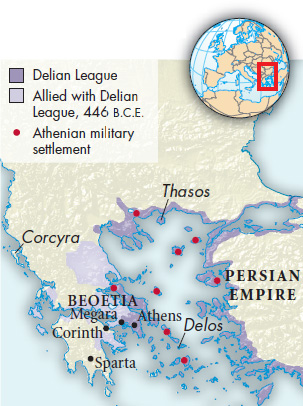Growth of the Athenian Empire

The defeat of the Persians created a power vacuum in the Aegean, and the Athenians took advantage of the situation. Led by Themistocles, the Athenians and their allies formed the Delian League, a military alliance aimed at protecting the Aegean Islands, liberating Ionia from Persian rule, and keeping the Persians out of Greece. The league took its name from the small island of Delos, on which stood a religious center sacred to all parties. The Delian (DEE-lee-uhn) League was intended to be a free alliance under the leadership of Athens, but as the Athenians drove the Persians out of the Aegean, they also became increasingly imperialistic. Athens began reducing its allies to the status of subjects. Tribute was often collected by force, and the Athenians placed the economic resources of the Delian League under tighter and tighter control. Major allies revolted, and were put down, for the Athenian ideas of freedom and democracy did not extend to the citizens of other cities.
The aggressiveness of Athenian rule also alarmed Sparta and its allies. Relations between Athens and Sparta grew more hostile, particularly when Pericles (PEHR-uh-kleez) (ca. 494–429 B.C.E.), an aristocrat of solid intellectual ability, became the leading statesman in Athens. Pericles gained support among the ordinary citizens of Athens by introducing measures that broadened democracy, such as lowering the property requirement for the position of archon. Like the democracy he led, Pericles was aggressive and imperialistic. In 459 B.C.E. Sparta and Athens went to war over conflicts between Athens and some of Sparta’s allies. The war ended in 445 B.C.E. with a treaty promising thirty years of peace, and no serious damage to either side. The treaty divided the Greek world between the two great powers, with each agreeing to respect the other and its allies.
Peace lasted thirteen years instead of thirty. Athens continued its severe policies toward its subject allies and came into conflict with Corinth, one of Sparta’s leading supporters. In this climate of anger and escalation, Pericles decided to punish the city of Megara, which had switched allegiance from Sparta to Athens and then back again. In 432 B.C.E. Pericles persuaded the Athenians to pass a law that excluded the Megarians from trading with Athens and its empire, a restriction that would have meant economic disaster for the Megarians. In response the Spartans and their allies declared war.